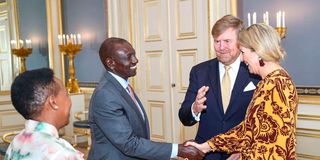
Britain's King Charles III (center) shakes hands with Kenyan President William Ruto as Kenyan Frist Lady Rachel Ruto (right) and Britain's Queen Camilla look on upon his arrival for the ceremonial welcome at the State House in Nairobi on October 31, 2023.
| AFPOur Columnists
Premium
The story of the media coverage of King Charles and two queens
Queen Máxima of the Netherlands was here on October 23-25, days before Britain’s King Charles III and Queen Camilla arrived.
She had visited the country three times earlier. She is the UN Secretary-General’s Special Advocate for Inclusive Finance for Development. She promotes financial health and inclusiveness for ordinary citizens.
During the Dutch queen’s three-day visit, she first went to Kisumu, where she met Governor Anyang’ Nyong’o and smallholder farmers and small business owners.
In Nairobi, she met small-business owners in Kawangware and Ngong. She also met with President William Ruto at State House, Treasury CS Prof Njuguna Ndung’u, Central Bank Governor Kamau Thugge, Equity Bank CEO James Mwangi and Ministry of Information CS Eliud Owalo.
At the UN Office, she attended UNDP’s launch of its new report on digital financial services for equitable growth.
Despite the importance of her visit the Nation gave her very little coverage. The paper published a picture-caption story on her last day in the country, which only said that she had given a press conference at the Radisson Blu Hotel in Nairobi (See “Her Majesty Queen Máxima of the Netherlands in Nairobi, Oct, 25, 2023, page 2).
The story said nothing of what she said at the conference. Taifa Leo gave her no coverage. Nation.Africa published only one story four days before her arrival, “Queen Máxima of Netherlands set to visit Kenya.” The story, by AFP, was based on a press release from the Royal House of the Netherlands.
The Business Daily devoted two pages of its “Life” section to a Q&A interview with the queen but it was published five days after she had already left the country (See “Queen Máxima’s push for financial inclusion in Kenya pays off” by Lynet Igadwah, Oct, 30, 2023). And Ms Igadwah’s first question was “Is this your first time in Kenya?” Answer: “Certainly not. I was here in 2005, 2006 and 2010....”
Contrast all that with the saturation coverage and front-page treatment given to King Charles and Queen Camilla. Admittedly, Máxima is not Camilla, the Netherlands is not the United Kingdom, and Kenyans have historical and sentimental attachment to the English monarchy and none to the Dutch. The UK is nearly six times larger than the Netherlands and has a GDP nearly 39 times bigger. Everything else being equal, the media give prominence to the powerful.

President William Ruto and First Lady Rachel (left) with Dutch King Willem Alexander (second right) and Queen Maxima (right) in The Hague, the Netherlands in June.
But it’s not as simple as that. Communication scholars have a more plausible explanation: The media give more prominence to some events and not others because of a function known as the agenda-setting theory.
The theory posits that the media has the ability to influence what people think is important by determining the events that receive the most attention. The more attention the media gives to certain events or issues, the more likely the public will perceive them as important.
The theory was introduced in 1972 by Maxwell McCombs and Donald Shaw, professors at the University of North Carolina. They set out two core assumptions. The mainstream media controls reality; they act as a filter allowing some aspects of the “reality” to reach their audience while blocking others.
They also give events or issues importance; the more they report on a certain issues the more likely is the public to perceive that particular event or issue as being of greater importance than others.
The theory explains the extensive media coverage given to the visit of King Charles and his wife Camilla and the little or no coverage given to Queen Maxima despite the significance of her mission to the livelihoods of many ordinary Kenyans.
* * *
This column recently ran a criticism of the use of the word “G-Spot” naming Faith Oneya’s column in “The Voice,” the Friday Nation gender magazine (See “When ‘Nation’ can use four-letter words without offending readers”, Oct. 27, 2023, page 21).
Dorcas Muga-Odumbe, NMG’s Editor, Gender & Education, responds: “The column G-Spot has run in the publication since its inception in 2019—we are on our 72nd edition—and nobody has ever complained before. ‘The Voice’ is a publication that targets women and girls and issues affecting them.
“The G-Spot, in particular, focuses on day-to-day social, political and economic issues around the said gender’s lives from a writer’s perspective. Our ‘G’ in this case stands for Girl/Gender. It’s in no way related to a woman’s anatomy.”
- The Public Editor is an independent news ombudsman who handles readers’ complaints on editorial matters including accuracy and journalistic standards. Email: [email protected]. Call or text 0721989264.





